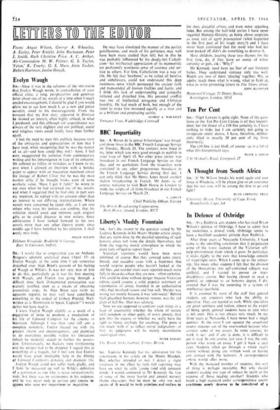In Defence of Oxbridge St R,--As a Redbrick arts student
who has read Bryan Wilson's defence of Oxbridge, I have to admit that he underlines a dismal truth. Oxbridge seems to have a healthier academic attitude than Redbriek.
After three years at Newcastle University, I have come to the unwilling conclusion that it perpetuates some of the worst features of the Victorian self- help environment from which it grew. In particular,' it sticks rigidly to the view that knowledge consists of water-tight units. When I came up to the univer- sity, like many other students I felt that the division ' of the Humanities into self-contained subjects was artificial, and I wanted to pursue an inter- disciplinary course. But having chosen to read a general, as opposed to an honotirs degree, I dis- covered that I was the underdog in a system of intellectual. apartheid.
It is assumed by most of the staff that general students are amateurs who lack the ability to specialise. They are treated as such. While specialists arc given seminars and tuition, almost to the extent of -being spoilt. general students have to take what is -left over. This is not always very much. In my three years.at .Newcastle. I have- never -had a single seminar. At the most I can squeeze the occash»tal twenty minutes out of the overworked lecturer who corrects some of my essays. In some courses, no work is set: and if any is done, it is difficult to get it read. In one course, last year, I was the only person who wrote an essay. I got it back a year later. Students often go through a whole year's course without doing any written work or having any contact with the lecturers. A correspondence course would offer more.
With the increased number of students, this sort of thing is perhaps inevitable. But why should students reading one type of subject be spoilt at the expense of those reading another? Students who .reach a high standard under correspondence course conditions surely deserve to be considered of a
higher calibre than failed specialists. But. Newcastle University does not think so.
While hard-working and conscientious, too many of the staff seem to think only in terms of- their departments. They often have little knowledge of what happens elsewhere in the university. Anybody whose course embraces several departments they are inclined to regard as dilettante.
While some members of the staff are trying very hard to redress the balance, one cannot help feeling that they are fighting an uphill battle against- dare 1?-a considerable quantity of vested interest, conservatism and plain complacency. We hear a lot about the complacency of Oxbridge. We ought to hear more about the complacency of Redbrick.
Had Harold Wilson chosen to study his politics, philosophy and economics at Redbrick rather than at Oxbridge, however brilliant his mind, he would have been classified as no better than a failed honours student. But-, with his unerring eye for the main chance, he did not make this mistake. While it continues to divide its students into first- and second-class citizens on an artificial but rigid basis. I cannot see how Redbrick will attract the more independent-minded.
The moral is quite simple. If you want a flexible and liberal education, you are more likely to get it at Oxbridge than at Redbrick.











































 Previous page
Previous page